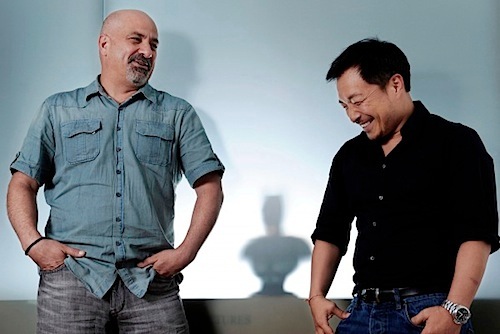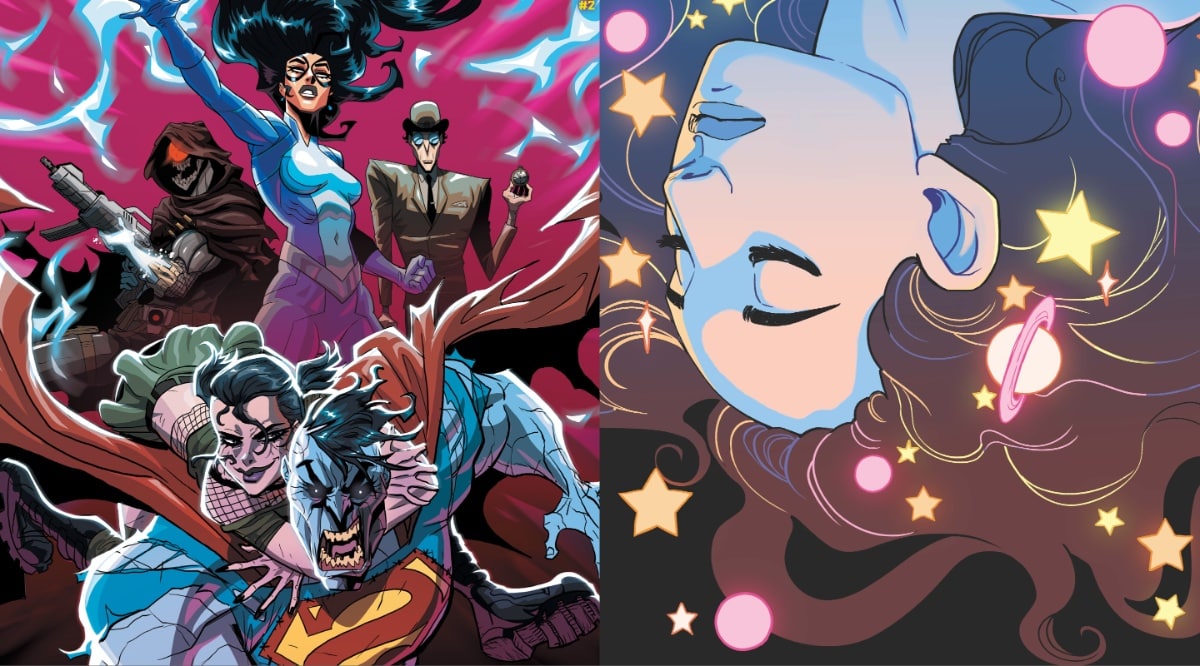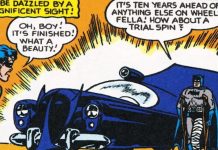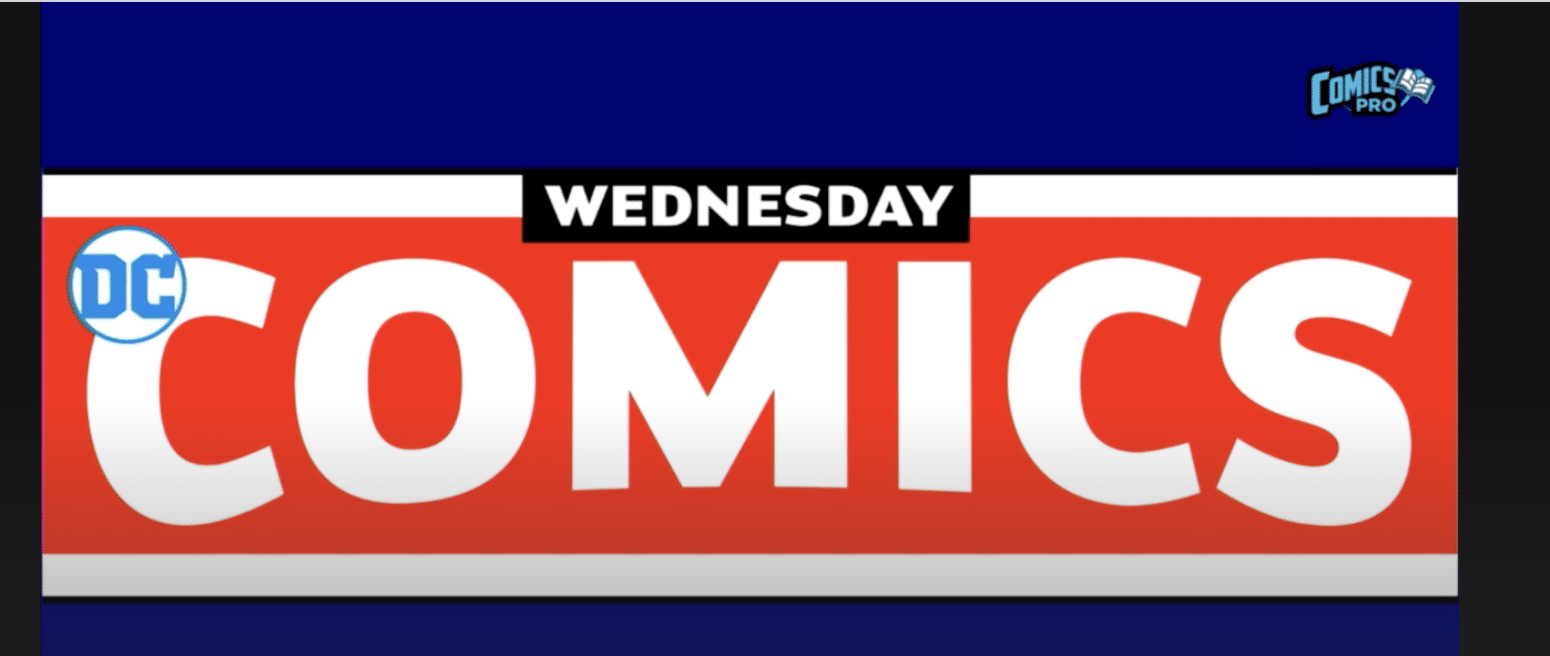ICv2 sits down with DC co-publishers Dan DiDio and Jim Lee and asks them sensible, hard questions. The whole thing is a must read, of course, and triangulates nicely with Diane Nelson’s interview in The Hollywood Reporter. Here are Part 1 and Part 2. Some takeaways:
• Business, as we keep hearing, is great.
• Variant covers don’t really move the needle all that much, Lee says.
In fact, the numbers are pretty dismal. It’s only when you do something special with a variant, whether it’s something clever like the 50 flags of the United States, or what we did with the throwback designs from Superman Unchained where we had a different Superman cover based on every era of the seven and a half decades that he’s been published, or if you look at the three motion covers that we’re doing for villain’s month–all unique propositions–that you do see a reaction from the marketplace because it’s a great way of promoting what you’re doing.
• Lee has a nice metaphor for the rise in discovery and new readers via digital readers: “With the advent of the iPad and all the tablet devices, we now have a little comic book shop in everyone’s home. It’s been the Holy Grail of the industry for many decades: how do we find new readers?”
• When asked about the creative shuffle, DiDio suggests, as he has in recent interviews, that it’s less than it was in decades past, and Lee suggests that every crisis is unique:
Lee: Without getting into the specifics, from the outside looking in, it might look like there’s a string of changes that point to one common theme, as you suggest. But from the inside looking out, you’ll see that each one has a different set of circumstances and conditions that ultimately led to the conflicts or the resignations or changes in creative personnel.
To me it’s the normal course of business in that not everyone’s going to agree creatively what to do with a book. The company has to reserve the right to control the destiny and the futures of the characters, and the creators have to decide if they’re willing to work in an environment where they’re telling their story but in the framework of a universe that has continuity and you have to work with all of these other different creators and editors that would want to control the directions of the characters.
• New WB head Kevin Tsujihara is very much on the case with DC, and the company is “on his radar.”
• Dan DiDio can’t wait for The Walking Dead TV show to end so more DC books will be on the BookScan charts. But graphic novel sales remain up overall as with all the other channels.
• Something big is happening with MAD, which is, after Batman and Superman, DC’s oldest, most trusted brand.
All you Kremlinologists can go read it for yourselves and then we can meet back here. My own takeaway? I heard a lot of rumors about “Changes at DC’ at San Diego and a lot of them seem to be mostly wishful thinking. But, it’s pretty clear from the sudden level of transparency that DC honchos suddenly have that a new mandate has been given for the West Coast, at least. Kevin Tsujihara is a digital guy and DC’s digital is doing pretty good (although a bunch of digital first comics were canceled recently, mostly under the radar). Also, if you have two awesome brands sitting around like Vertigo and MAD (and even kids’ comics, the fastest growing segment of the industry) maybe giving them a little goose is a good idea.
I think Lee and DiDio’s comments pretty much cement the view of “corporate comics” that I’ve been tracking here at The Beat over the last few years. I mean, that was a no-brainer. (The term even was used in the NY Times the other day.) But as Lee points out, there are more options than ever, even if there are fewer options for a DC-sized page rate.








“Dan Didio can’t wait for The Walking Dead TV show to end so more DC books will be on the Bookscan charts.”
LOL – He just said what every editor at every comic company other than Image is thinking.
“• Something big is happening with MAD, which is, after Batman and Superman, DC’s oldest, must trusted brand.”
Seems like AGES since MAD was funny.
Jesus. He wants Walking Dead to end so DC will do better on bookscan
A) this would mean nothing to DC. Walking Dead not being around won’t make those fans by Rage of the Red Lanterns TPB. DC might do a bit better in rank, but it wouldn’t mean any extra money in their pocket.
B) Says a lot about Didio that he’d rather have someone else stop innovating than have to actually innovate himself.
“bunch of digital first comics were cancelled recent mostly under the radar” The link in there gets a 404 error.
“He wants Walking Dead to end so DC will do better on bookscan”
I’m pretty sure his tongue was likely firmly in his cheek when he said this. Especially considering this being the first answer he gave in the interview:
“It’s interesting to us to watch as the other companies are being very aggressive in a good way, and I think it builds a very strong competitive market and makes sure we’re on the best of our game.”
“Says a lot about Didio that he’d rather have someone else stop innovating than have to actually innovate himself.”
One title taking up the majority of the chart is hardly innovation. It’s Walking Dead being the new go to franchise, like Saga or Batman or X-Men. Walking Dead is consistently one of my favorite comics month in and month out, but you can hardly call a ten year old property based on a zombie apocalypse landscape innovative. At the very least, it stole it’s whole concept from the first three Romero movies, which are themselves are creeping up to 50 years old.
It was a little tongue in cheek, but I think it will be a good few years before the highest rated show in the history of basic cable gets cancelled. It just seemed funny to me.
TWD has fallen down the charts a bit since the show went off the air but I expect in October they will skyrocket again, and that pattern will be repeated.
I know what Didio and Lee are laughing about now.
@Erik – I wasn’t there, so I can’t guess as to what his tone was. But either way, Walking Dead is hardly a franchise in the way Batman and X-Men are. It’s one book that’s been adapted into different forms. Batman and X-Men are a family of books that have been passed around by other creators, not only in their native industry but in mainstream media as well. And Saga isn’t a franchise in the slightest.
I imagine having Walking Dead drop off would help DC. People want more things than they can afford. When the options reduce, they still may buy as much in quantity.
@Zach – My larger point was that out of the large amount of books being published, Walking Dead and Saga are the exception, not the rule, of things outside the big two being successful. And in that, Walking Dead is far from an innovative idea. That being said, Walking Dead, with it’s merchandise, TV show, video games, et al is a lot more successful then some properties from the big two could ever be. So on it’s own a relative level, I would say it absolutely is a franchise at this point in the same way Batmen and X-Men is. The fact that it’s only one book comes down to the creator’s handling of the property more then anything else. If Kirkman wanted to spin of more books he absolutely could (he’s done it with Invincible for example) but just chooses not to (although one could argue that the TV show stands in almost as an example of a second book for him in this regard.)
And I supposed we will have to agree to disagree whether or not Saga is a franchise, at least at this point. In my opinion, it may not be an established franchise, as it’s only a year in, but I think it could easily be considered it’s own young critically successful franchise.
@Zach – As an addendum to my previous post, let’s exchange the term “franchise” with brand, as you are right, franchise points more towards something commercial that Saga most definitely is not yet at this point. I stand corrected.
$4 comics suck
comicsatemybrain:
I saw the link wasn’t working either. If you don’t know what the books are, Ame-Comi Girls ends with #8. Arrow ends with #12. But most people are assuming they’ll do a new #1 when the new season starts.
And Legends of the Dark Knight is ending its monthly run with #13 going to a print in TPB format only model.
Lee says: <>
What he means is the really lame B&W DC “sketch covers” did not move the needle. He goes on to contradict himself in saying that when they churn out some actually interesting variant, they do have an effect on sales.
For some reason comic fans love buying those shiny variants that look cook. Make ones that do not look cool & they will warm the back issue bins.
seems to have dropped my quotation from Lee on variants:
Variant covers don’t really move the needle all that much
In fact, the numbers are pretty dismal. It’s only when you do something special with a variant, whether it’s something clever like the 50 flags of the United States, or…..
They should relaunch MAD as a comic
A few comments on the interview:
Does DiDio actually think that DC has continuous continuity in a continuous universe? That all the crises, relaunches, and reboots weren’t continuity revisions?
I’d prefer that graphic novels be reserved for publications conceived as GNs, and that collections be used for series collections.
The success of THE WALKING DEAD (TWD) is, IMO, more an indicator of the niche status of superhero comics in the publishing industry than it is a testimonial to the excellence of TWD. Comics will have succeeded as a format when OGNs regularly appear on general bestseller lists.
If people buy the comics for the covers, then they’re not buying them for the content, per se.
Overall, ICv2’s questions were good, but there was an absence of follow-up questions. Getting an idea of how profitable the best-selling comics are, versus the poorest-selling titles–is money actually lost on titles that are canceled?–would have been nice.
Somebody at ICv2 should be embarrassed at having DiDio misspelled throughout the interview.
SRS
You’re correct, Didio. If “the talking dead” goes off the air, that will help D C Comics.
@Syn re: Continuity
I would say it depends on which side he — and anyone — butters their bread.
In the Hollywood sense, the new Star Treks are reboots. In an anal retentive continuity fiend’s mind, the stories are continuous continuity of the original, now progressing on an alternate timeline at an earlier point. Interesting that some would say Spock the elder complicates the “simple reboot” take.
But then, isn’t Flashpoint’s Pandora our New52 original Spock?
In the same way, Crisis on Infinite Earths, was viewed as simple continuity reboot by some. By others, the originals all happened but retroactively altered by later events occurring at the dawn of time onward — certainly plausible in the comics’ world. Again, what was a simple reboot was also just another new chapter in a continuous continuity. I don’t know whether Crisis mucking up continuity (Superboy / Legion mythology among notables) far worse than what may have been simplified is evidence for or against either side.
All that aside, I would agree that IF legal is dictating major continuity revisions out of concern that the loss of a pillar of one’s entire intellectual property universe may be (have been) imminent, well then I think those revisions need to be suspect from a creative view.
Silly but True
I’d like to understand how Jim Lee came to the conclusion that retailers are flush with cash… did he really say that? When has THAT ever happened?
The critical element, I think, is the lack of marketing. It would be much easier, from an editorial standpoint, just to stop series, redesign the universe, change histories as needed, and then to relaunch the series, accompanied by a marketing campaign to attract buyers. But in the absence of a marketing campaign, DC Editorial probably feared that existing readers would regard simple cancellation and a restart as the perfect jumping-off point. So they engineered the crises.
But if there aren’t enough “continuity-conscious” readers to ensure profitability, then the clumsiness of the crises isn’t worth it. Either find a way to reach a mass audience or give up.
At one time, people might have worried that simple cancellation and reboots might have resulted in legally distinct versions of characters, but the nature of work-for-hire contracts is well understood now.
SRS
MAD is still being published?
Last I heard, it was being cut to quarterly publication. And that was a few years ago.
Comments are closed.